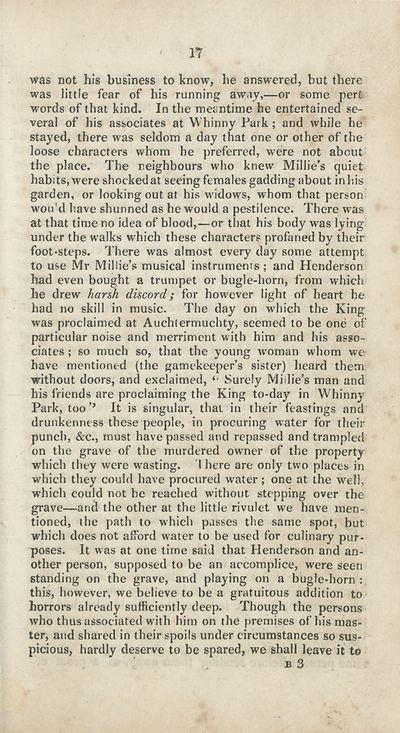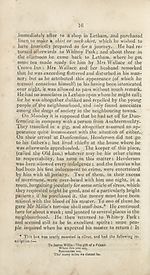Download files
Complete book:
Individual page:
Thumbnail gallery: Grid view | List view

17
was not his business to know, he answered, but there
was little fear of his running away,—or some pert
words of that kind. In the meantime he entertained se¬
veral of his associates at Whinny Park; and while he
stayed, there was seldom a day that one or other of the
loose characters whom he preferred, were not about
the place. The neighbours who knew Millie’s quiet
habits, were shocked at seeing females gadding about in his
garden, or looking out at his widows, whom that person
woo'd have shunned as he would a pestilence. There was
at that time no idea of blood,—or that his body was lying
under the walks which these characters profaned by their
foot-steps. There was almost every day some attempt
to use Mr Millie’s musical instrumems; and Henderson
had even bought a trumpet or bugle-horn, from which
he drew harsh discord; for however light of heart he
had no skill in music. The day on which the King
was proclaimed at Auchlermuchty, seemed to be one of
particular noise and merriment with him and his asso¬
ciates ; so much so, that the young woman whom we
have mentioned (the gamekeeper’s sister) heard them
without doors, and exclaimed, ‘ Surely Millie’s man and
his friends are proclaiming the King to-day in Whinny
Park, too ’’ It is singular, that in their (eastings and
drunkenness these people, in procuring water for their
punch, &c., must have passed and repassed and trampled
on the grave of the murdered owner of the property
which they were wasting. I here are only two places in
which they could have procured water; one at the well,
which could not be reached without stepping over the
grave—and the other at the little rivulet we have men¬
tioned, the path to which passes the same spot, but
which does not afford water to be used for culinary pur¬
poses. It was at one time said that Henderson and an¬
other person, supposed to be an aecomplice, were seen
standing on the grave, and playing on a bugle-horn :
this, however, we believe to be a gratuitous addition to
horrors already sufficiently deep. Though the persons
who thus associated with him on the premises of his mas¬
ter, and shared in their spoils under circumstances so sus¬
picious, hardly deserve to be spared, we shall leave it to
was not his business to know, he answered, but there
was little fear of his running away,—or some pert
words of that kind. In the meantime he entertained se¬
veral of his associates at Whinny Park; and while he
stayed, there was seldom a day that one or other of the
loose characters whom he preferred, were not about
the place. The neighbours who knew Millie’s quiet
habits, were shocked at seeing females gadding about in his
garden, or looking out at his widows, whom that person
woo'd have shunned as he would a pestilence. There was
at that time no idea of blood,—or that his body was lying
under the walks which these characters profaned by their
foot-steps. There was almost every day some attempt
to use Mr Millie’s musical instrumems; and Henderson
had even bought a trumpet or bugle-horn, from which
he drew harsh discord; for however light of heart he
had no skill in music. The day on which the King
was proclaimed at Auchlermuchty, seemed to be one of
particular noise and merriment with him and his asso¬
ciates ; so much so, that the young woman whom we
have mentioned (the gamekeeper’s sister) heard them
without doors, and exclaimed, ‘ Surely Millie’s man and
his friends are proclaiming the King to-day in Whinny
Park, too ’’ It is singular, that in their (eastings and
drunkenness these people, in procuring water for their
punch, &c., must have passed and repassed and trampled
on the grave of the murdered owner of the property
which they were wasting. I here are only two places in
which they could have procured water; one at the well,
which could not be reached without stepping over the
grave—and the other at the little rivulet we have men¬
tioned, the path to which passes the same spot, but
which does not afford water to be used for culinary pur¬
poses. It was at one time said that Henderson and an¬
other person, supposed to be an aecomplice, were seen
standing on the grave, and playing on a bugle-horn :
this, however, we believe to be a gratuitous addition to
horrors already sufficiently deep. Though the persons
who thus associated with him on the premises of his mas¬
ter, and shared in their spoils under circumstances so sus¬
picious, hardly deserve to be spared, we shall leave it to
Set display mode to:
![]() Universal Viewer |
Universal Viewer | ![]() Mirador |
Large image | Transcription
Mirador |
Large image | Transcription
| Antiquarian books of Scotland > Crime & punishment > Whinny Park murder > (31) |
|---|
| Permanent URL | https://digital.nls.uk/126151037 |
|---|
| Description | Thousands of printed books from the Antiquarian Books of Scotland collection which dates from 1641 to the 1980s. The collection consists of 14,800 books which were published in Scotland or have a Scottish connection, e.g. through the author, printer or owner. Subjects covered include sport, education, diseases, adventure, occupations, Jacobites, politics and religion. Among the 29 languages represented are English, Gaelic, Italian, French, Russian and Swedish. |
|---|

